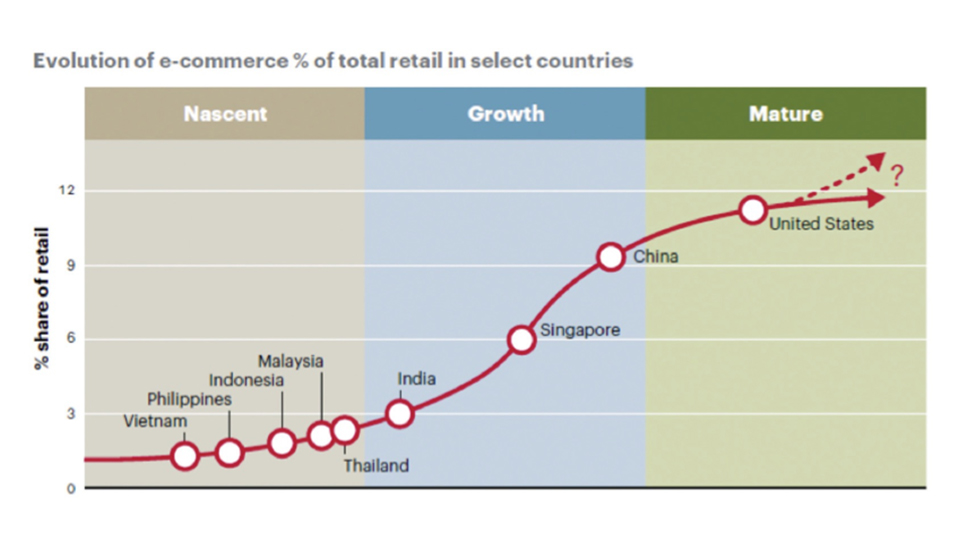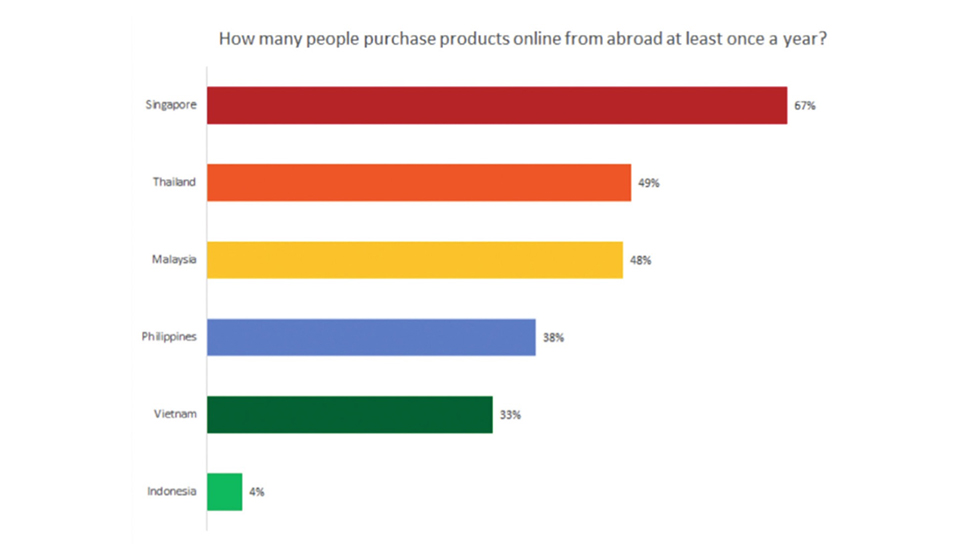E-commerce in ASEAN:
Cross border challenges
Payments
Security and reliability of payment is a major concern for most businesses and consumers in Indonesia, Philippines, Thailand and Vietnam. Cash On Delivery (COD) is still the preferred payment method in most of these countries. In Indonesia, as an example, credit card penetration is less than 15 per cent. In some countries, COD can be anywhere from 50–70 per cent total orders shipped. In Malaysia, cross-border payments are getting more acceptances and the overall payment landscape is competitive. On the other hand, Singapore has the most mature e-Commerce payment infrastructures in Southeast Asia. Singapore’s various payment systems are reliable and the overall credit card penetration is very high, which is attractive as a target market for cross-border e-commerce. Brands and retailers entering the Singapore e-commerce market can expect a mature online shopper with high trust in online payment methods.
Logistics
Southeast Asia has unique last mile delivery challenges. The cost and capability of logistics providers in Malaysia and Thailand are highly ranked, but there are last mile issues in the country that need to be addressed. In Philippines and Vietnam, there are networks of small logistics players in metro regions, but shipping to the rural areas can be challenging. Indonesia comprises of more than 15,000 islands with only 53 per cent of population living in cities, presenting massive logistical issues.
Customs and border administration
Amongst most countries in ASEAN, custom transparency, and inconsistent custom procedures remain to be areas for concerns. Today, import procedures, VAT and duties differ across countries and for different product types. Singapore stands out in the region with strong clarity and consistency of the customs and borders process. Customs and tax procedures are straightforward and corruption is at a global record low.
Foreign market access
In Indonesia, Philippines, Thailand and Vietnam, challenges remain for smaller international enterprises outside the countries to sell their products and services there, since there is a lack of regulations for e-commerce and non-tariff barriers still apply over a broad range of products. Malaysia has a large number of free trade agreements that allow foreign business access, but there are still some minor hurdles when accessing the market. Only the Singapore government recognises the value of lowering barriers to trade and actively pursues an agenda of open trade borders.
E-commerce regulatory environment
In Philippines and Vietnam, dedicated e-commerce offices and agencies have been created to help reshape the regulatory environment. One example is an e-commerce trustmark which is a logo displayed on the website to indicate that the business has been shown to be trustworthy by the issuing organisation (such as TRUSTe and VeriSign). Although intended as a way for shoppers to be reassured that websites are securely processing information, there is still a way to go before consumers are aware and look out for these trustmarks. Furthermore, the trustmark that e-commerce companies can acquire does not appear to be trusted by consumers in some of the developing countries in ASEAN. Indonesia and Thailand lack chapters supporting e-commerce and law supporting businesses going crossborder.
Regulatory environment for cross-border
E-commerce in Malaysia is relatively strong but enforcement of existing regulations could be improved. Singapore, on the other hand, has taken the lead across the region in adopting many forward-looking regulations that address e-commerce.
This article was adapted from “Singapore: E-Commerce. Gateway to ASEAN and Southwest Pacific”, a supplement published by Supply Chain Asia.
To read more about Singapore’s industry initiatives for e-commerce, click here.
To read more about Singapore’s last mile delivery developments and case studies, click here.









